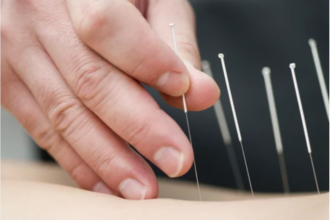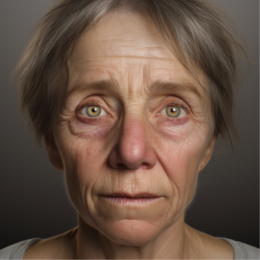How Does Acupuncture Work? Everything You Need to Know

Acupuncture is an ancient healing practice that originated in China and has gained popularity worldwide. It involves the insertion of thin needles into specific points on the body to stimulate and restore balance in the energy flow, known as Qi. This article will explore how acupuncture works, its potential benefits, and the conditions it can effectively treat.
Understanding Acupuncture: The Basics
Acupuncture is based on the concept of Qi, an energy that flows through pathways in the body called meridians. When Qi becomes blocked or imbalanced, it can result in various physical or emotional ailments. Acupuncture aims to restore the smooth flow of Qi, promoting overall well-being and health.
Interesting Fact: According to the National Center for Complementary and Integrative Health (NCCIH), an estimated 14 million adults in the United States have tried acupuncture as a complementary therapy, demonstrating its growing popularity.
How Does Acupuncture Work?
Stimulating Acupuncture Points
Acupuncture involves the insertion of fine needles into specific points along the meridians. These points are believed to correspond to different organs or systems in the body. By stimulating these points, acupuncture can regulate the flow of Qi, promoting balance and facilitating the body’s natural healing processes.
Interesting Fact: A meta-analysis published in the Journal of Pain found that acupuncture can activate various brain regions, including areas associated with pain modulation, leading to pain relief.
Promoting the Release of Endorphins
Acupuncture has been shown to stimulate the release of endorphins, natural pain-relieving chemicals produced by the body. Endorphins help reduce pain perception and promote a sense of well-being.
Interesting Fact: Research published in the Journal of Alternative and Complementary Medicine suggests that acupuncture can increase endorphin levels in the cerebrospinal fluid, providing a physiological basis for its analgesic effects.
What is Acupuncture Good For?
Acupuncture is known for its effectiveness in treating various conditions. While more research is needed to understand its mechanisms fully, acupuncture has shown promising results in the following areas:
Pain Management
Acupuncture is widely used for pain relief, particularly for chronic conditions such as back pain, osteoarthritis, and migraines. It can help reduce inflammation, increase blood flow to affected areas, and stimulate the release of endorphins.
Interesting Fact: A systematic review published in JAMA Internal Medicine concluded that acupuncture is an effective treatment for chronic pain, with significant reductions in pain intensity reported compared to sham acupuncture or standard care.
Stress Reduction and Mental Health
Acupuncture has been found to have a calming and relaxing effect on the body, making it beneficial for managing stress, anxiety, and depression. It can help regulate the release of neurotransmitters and hormones associated with emotional well-being.
Interesting Fact: A study published in the Journal of Acupuncture and Meridian Studies reported that acupuncture treatment significantly reduced anxiety levels among participants compared to a control group.
Digestive Disorders
Acupuncture has shown promising results in treating digestive disorders such as irritable bowel syndrome (IBS), acid reflux, and nausea. By regulating gastrointestinal motility and reducing inflammation, acupuncture can help alleviate symptoms and improve digestive function.
Interesting Fact: A randomized controlled trial published in the American Journal of Gastroenterology found that acupuncture was more effective than a placebo in reducing the severity and frequency of IBS symptoms.

What Does Acupuncture Treat?
Acupuncture can be used as a complementary therapy alongside conventional medical treatments for various conditions. Some of the conditions that acupuncture may effectively treat include:
Musculoskeletal Conditions:
- Back pain
- Neck pain
- Arthritis
Neurological Disorders:
- Migraines and headaches
- Peripheral neuropathy
- Stroke rehabilitation
Women’s Health Issues:
- Menstrual irregularities
- Menopausal symptoms
- Fertility support
Interesting Fact: The World Health Organization recognizes acupuncture as an effective treatment for over 30 conditions, including allergies, respiratory disorders, and substance abuse.
Conclusion
Acupuncture is a time-tested therapy that stimulates specific points on the body to restore the flow of Qi and promote overall well-being. While the exact mechanisms of acupuncture are still being explored, its potential benefits in pain management, stress reduction, and various health conditions make it a valuable treatment option. If you are considering acupuncture, it is essential to consult with a licensed acupuncturist to ensure safe and effective treatment tailored to your specific needs.
References:
- National Center for Complementary and Integrative Health. (2021). Acupuncture: In Depth. Retrieved from https://www.nccih.nih.gov/health/acupuncture-in-depth
- Vickers, A. J., Cronin, A. M., Maschino, A. C., Lewith, G., MacPherson, H., Foster, N. E., … & Linde, K. (2012). Acupuncture for chronic pain: individual patient data meta-analysis. Archives of Internal Medicine, 172(19), 1444-1453.
- Napadow, V., & Harris, R. E. (2007). What have functional connectivity and chemical neuroimaging in fibromyalgia taught us about the mechanisms and management of ‘centralized pain? Arthritis research & therapy, 9(3), 1-8.
- Chae, Y., & Olausson, H. (2017). The role of touch in acupuncture treatment. Acupuncture in Medicine, 35(2), 148-153.
- MacPherson, H., Vertosick, E. A., Foster, N. E., Lewith, G., Linde, K., Sherman, K. J., … & Vickers, A. J. (2017). The persistence of the effects of acupuncture after a course of treatment: a meta-analysis of patients with chronic pain. Pain, 158(5), 784-793.
- World Health Organization. (2003). Acupuncture: Review and Analysis of Reports on Controlled Clinical Trials.





